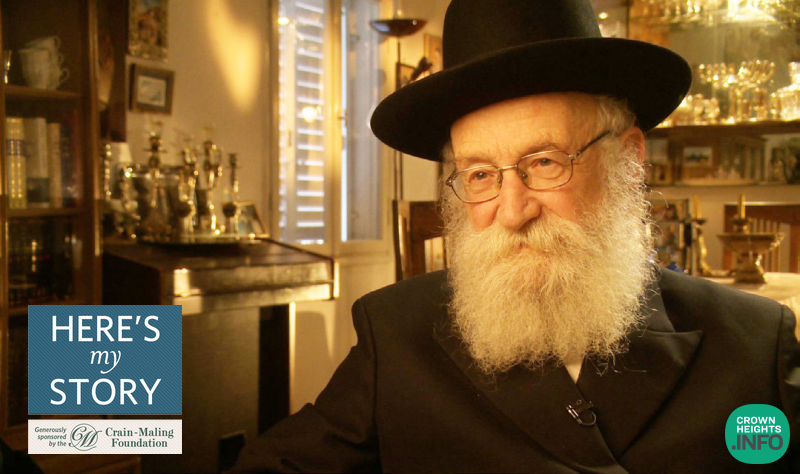
Here’s My Story: The Critic
Rabbi Meir Tzvi Gruzman
Click here for a PDF version of this edition of Here’s My Story, or visit the My Encounter Blog.
During the mid-1980s, I directed a branch of Tomchei Temimim, the Chabad yeshivah network, in the town of Kiryat Malachi, in Israel. While I was there, a certain mashpia, or chasidic mentor to the students, worked on instilling within the students a tremendous enthusiasm for the various mitzvah campaigns being promoted by the Rebbe, which involved sharing mitzvot with other Jews. Their strong commitment to these outreach activities, however, began to interfere with their regular study schedule. It happened on more than one occasion that after going out on mivtzoyim, as these activities are called, the students returned to yeshivah quite late.
At one point, the students turned to me with their dilemma: “What should we do when mivtzoyim get in the way of learning Torah?”
In turn, I wrote a letter to the Rebbe, putting the question to him. As the Rebbe was such a strong proponent of these outreach activities, did he intend for students to engage in them at the expense of Torah study? Perhaps these mitzvah campaigns were so urgently needed that they should be done even if meant studying less Torah — but on the other hand, perhaps the students were supposed to get involved in mivtzoyim only so long as they didn’t interfere with their studies.
“A tomim,” replied the Rebbe, using the moniker for students of Tomchei Temimim, “is first and foremost a tomim. Mivtzoyim can only be with permission from the faculty.” The word “tomim” was underlined twice, and “first and foremost” had three lines under it!
His point was that it was the faculty’s job to determine how much time the students could dedicate to outreach work, outside of formal study times, without interfering in the student’s ability to fully devote himself to his main task — learning Torah. Therefore, all such activities had to be coordinated and approved by the faculty.
Over the years I spent working in Tomchei Temimim, in that particular branch and elsewhere, the Rebbe taught me several other important lessons about the nature and the priorities of the yeshivah. On one occasion, there was a certain very serious young man who had some complaint about members of the faculty, whether it was a Talmudic lecturer, mashpia, or the dean of students. “Why don’t you talk to the Rebbe about this?” he would often demand of me.
Before one trip I made to New York, he asked that I discuss with the Rebbe several issues in the yeshivah which, as he saw it, needed to be addressed. I refused, seeing as I disagreed with some of his claims.
“Write to the Rebbe yourself,” I suggested. “Then, if the Rebbe wishes, he will speak about it with me.” But I also asked that he send me a copy of his letter so that I will know what he has written, in case the Rebbe chose to bring the subject up with me.
The student wrote to the Rebbe and sent me a copy, but then told me that he didn’t think the letter would actually end up reaching its destination because he hadn’t attached enough stamps on the envelope. Could I bring the letter to my meeting with the Rebbe, after all?
Unsure of what to do, I decided that I would simply ask the Rebbe. When I came to my audience, I told him the whole story, and that I objected to some of the things the student had written — should I still present his letter?
The Rebbe said that I should. The letter writer was responsible for his own words, he explained, and I was just passing it on. As I handed it to him, the Rebbe held the still-closed envelope, and stated:
“You have to tell this young man that Tomchei Temimim, for the most part, is built and founded on its students, the temimim. All of the faculty are only there to help the students flourish. If one finds some shortcoming in Tomchei Temimim, one must know that, for the most part, it is a shortcoming within the student body. Since he is one of the temimim, he must resolve these problems within himself, instead of looking at the faculty.”
The Rebbe said all of this even before opening the letter.
Every time the Rebbe discussed the yeshivah with me, he became extraordinarily focused, and his manner very serious. When he spoke about the students, his words came from the heart, and he often became emotional; it was clear just how much he cared about them.
During one audience, I began by asking the Rebbe about some personal matter, and then later added a question regarding an issue in the yeshivah. The Rebbe admonished me: “This is what happens when we give our own affairs pride of place,” he said in a pained tone, “but leave the most important things in the corner.”
It was then that I learned that the Rebbe expected me to make the yeshivah a priority in my life.
Rabbi Meir Tzvi Gruzman was one of the first lecturers in the Tomchei Temimim yeshivah in Lod, Israel, and went on to serve as one of the heads of Tomchei Temimim in Kfar Chabad for nearly fifty years. He was interviewed in his home in November 2011.










